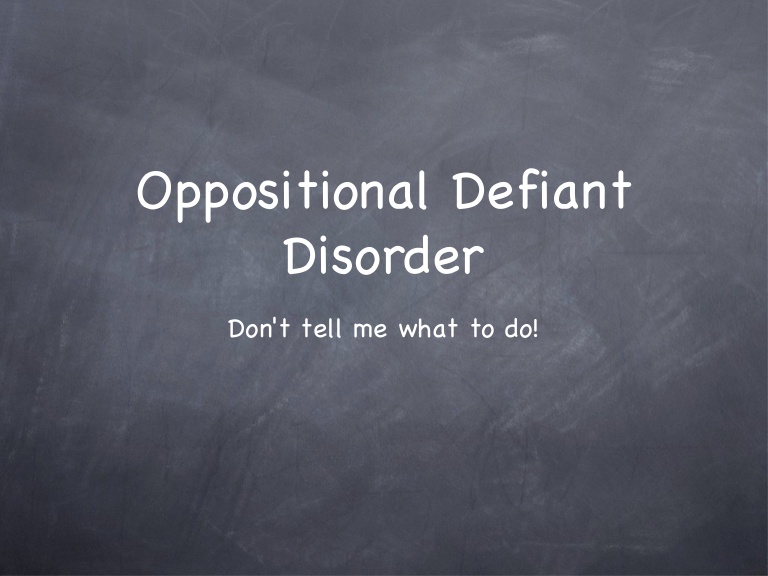
Oppositional Defiant Disorder:
ODD is defined in DSM-V as a pattern of angry/irritable behavior, or vindictiveness lasting at least 6 months (in this case 3 years), and is exhibited during interaction with at least one individual that is not a sibling (like a co-worker).
Individuals must display four symptoms from one of the following categories: angry/irritable mood (yelling when spoken to), argumentative/defiant behavior (refusal to follow workplace policy), or vindictiveness [including retaliation] (physically hurting or conspiring to hurt someone).
Mainly these symptoms are used to describe children w/ impairment..... But it has been noted in DSM-V that the exact behavior can also be prevalent in adults.
Signs and Symptoms:
Some signs and symptoms (4 out of eight) that must be perpetuated for longer than six months and must be considered beyond normal child behavior to fit the diagnosis are:
- Actively Refuses to Comply with Majority's Requests or Consensus-supported Rules (i.e. Workplace Policy)
- Performs Actions Deliberately to Annoy Others (Use of foul-chemical-smelling lotion; Making a show of whispers to others; Talks loudly phone to disturb others; Usurps job duties & authority of others....)
- Angry and Resentful of others (Uses divide & conquer techniques amongst co-workers)
- Argues Often (When given a task challenges ways & means of assignment)
- Blames others for his/her own mistakes
- Frequently Loses Temper (Yells when asked for help, interrupted, mistakes are asked to be corrected)
- Spiteful or Seeks Revenge (After being caught purposely doing something wrong)
- Touchy or Easily Annoyed
 These patterns of behaviors result in impairment at school and/or other social venues (work).
These patterns of behaviors result in impairment at school and/or other social venues (work).Common features of ODD include excessive, often persistent anger, frequent temper tantrums or angry outbursts, as well as Disregard for Authority. Children and adolescents (and some adults) with ODD Purposely Annoy Others, Blame others for their own mistakes, and are easily disrupted..... In addition these young people may appear Resentful of others, and when someone does something they don't like they Prefer REVENGE over more sensitive solutions.
 The exact cause of ODD is unknown, but it is believed that a combination of biological, psychological, and environmental factors may contribute to the condition:
The exact cause of ODD is unknown, but it is believed that a combination of biological, psychological, and environmental factors may contribute to the condition:- Genetic influences
- Prenatal factors & birth complications
- Microbiological factors
- Social-cognitive factors (...Immature forms of thinking [such as egocentricism], failure to use verbal mediators to regulate his/her behavior,and cognitive distortions, such as interpreting a neutral event as an intentional hostile act {such as walking into the spraying of 100% natural content "stress less" room mist... which was spritzed from behind a cubicle wall, rendering the walker unseen}
- Societal Factors
- Cultural Factors
One of the key factors in the development ans maintenance of the negative behaviors associated with ODD symptoms is reinforcement (Enabling), whether intentional or not, of the unwanted behaviors. The most effective way of treating disruptive behavior disorders is Behavioral Therapies.
 Positive reinforcement (Enabling/Ignoring) often unintentionally contributes to an increase in the frequency of ODD behaviors. Behavior therapies can be applied to a wide range of psychological symptoms among, children, adolescents, and ADULTS w/ ODD....... An Example of how Positive Reinforcement (Enabling) can occur is When the Patient is Rewarded with Attention when performing ODD behaviors. Attention is reinforcing itself and the reinforcing attention could be accidentally given, ironically when trying to create a negative consequence to their behavior.
Positive reinforcement (Enabling/Ignoring) often unintentionally contributes to an increase in the frequency of ODD behaviors. Behavior therapies can be applied to a wide range of psychological symptoms among, children, adolescents, and ADULTS w/ ODD....... An Example of how Positive Reinforcement (Enabling) can occur is When the Patient is Rewarded with Attention when performing ODD behaviors. Attention is reinforcing itself and the reinforcing attention could be accidentally given, ironically when trying to create a negative consequence to their behavior.Epidemiology:
ODD has an estimated lifetime prevalence of 9.2% for females. According to a 1992 article, if left untreated, about 52% of children w/ ODD will continue to meet the DSM-IV criteria up to three years later, and about half of those will progress into Conduct Disorder (CD). CD may progress into Anti-Social Personality Disorder. This strong correlation between strong defiance in childhood and Adulthood may suggest mechanisms for Hostility toward Established Authority by both children and Adults.
See also:
- Antiscocial Personality Disorder
- Attention deficit hyperactivity disorder (ADHD)
- Conduct Disorder
- Counterdependency
- Parent management training
- Passive-Aggressive Behavior


























No comments:
Post a Comment